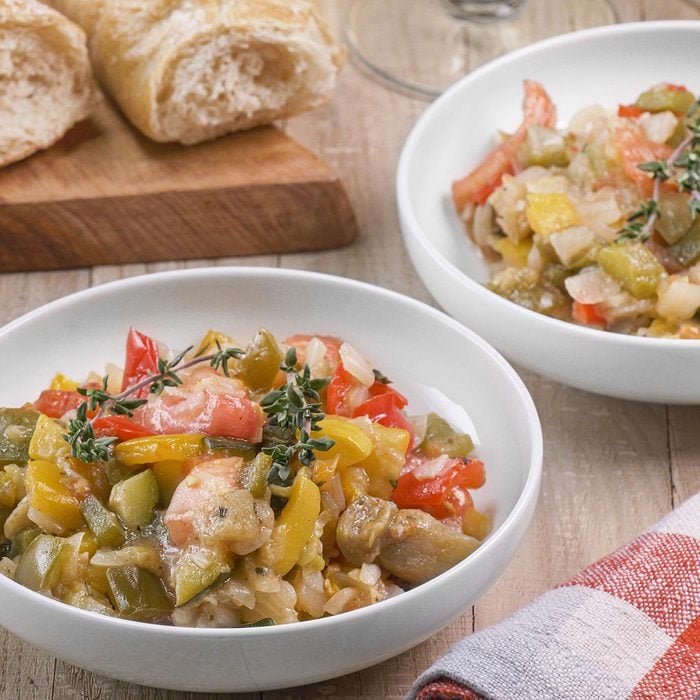I have memories of growing up and my mother spending a whole day in the kitchen making her ratatouille with vegetables harvested from my father’s garden. She lovingly cooked each vegetable slowly and individually, a very classic way to prepare this summer dish. This ratatouille recipe packs all that fresh south-of-France flavor, and it comes together in a fraction of the time.
What is ratatouille?
Ratatouille is a classic vegetarian dish that showcases the freshest in-season summer produce. As long as the dish has eggplant, Mediterranean herbs and tomato, it can be considered ratatouille, but it normally also contains zucchini, yellow summer squash and colorful bell peppers. Recipes vary from person to person—the vegetables change, or maybe they’re cut differently—but they always result in a melange of tender vegetables cooked in a vibrant, garlic-and herb-scented sauce.
As with Sicilian caponata, the goal is to let the vegetables shine. You want the dish to taste like a beautiful summer somewhere in the Mediterranean.
Ingredients in Ratatouille
- Eggplant: Almost any eggplant works well with this recipe. The most common varieties you’ll find at the grocery store or farmers market are the large, dark Italian globe eggplant, the slender, bright violet Japanese eggplant, and the long, light purple Chinese eggplant. There’s also the graffiti eggplant, with its speckled skin. This recipe calls for the eggplant to be peeled, but you can also leave the peel on if you prefer that look. It adds a touch of fiber too.
- Tomatoes: As with most types of tomatoes, you want to use bright red and fully ripe fruit. For this ratatouille recipe, look for heavy, firm plum tomatoes or tomatoes on the vine.
- Bell peppers: This variation of ratatouille calls for three bell peppers: green, red and yellow. They vary in sweetness but are more or less interchangeable. Don’t sweat it if you only have one color. Use any extra in these bell pepper recipes.
- Zucchini and summer squash: Use your favorite types of summer squash for ratatouille, including zucchini, pattypan, crookneck yellow squash and other varieties. Use small to medium squash, as the large ones tend to get more seedy and less tender.
- Fresh herbs: As with the vegetables, using fresh thyme and rosemary is best for ratatouille. If you only have dried herbs, that will do.
- Olive oil: When it comes to choosing an olive oil, use the best olive oil for cooking. Save the really high-end stuff for salad dressings or finishing a dish.
Directions
Step 1: Start with garlic and onions
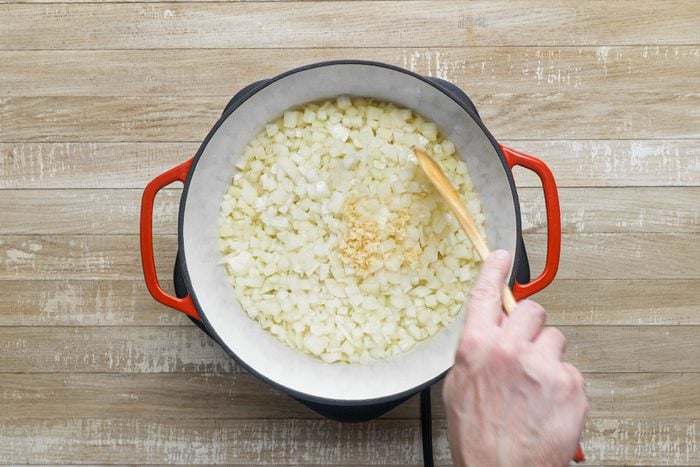
In a Dutch oven, saute the onions and garlic in 1 tablespoon of olive oil until they’re tender. Reduce the heat to low.
Step 2: Saute the vegetables
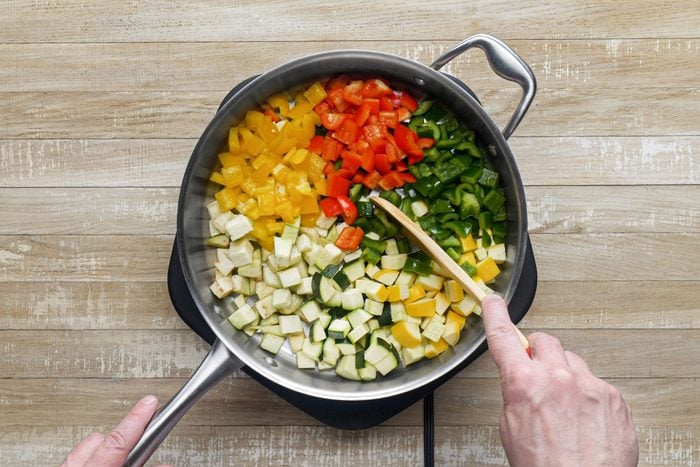
In a large skillet, add the remaining oil and saute the eggplant, zucchini, squash and peppers in batches until they’re lightly browned, adding each batch of vegetables to the Dutch oven with the onions and garlic.
Editor’s Tip: Use a 12-inch straight-sided sauce pan (aka a saucier pan) like this Le Creuset Everyday Pan. This gives you more surface area and help to reduce the liquid.
Step 3: Add the stock and seasonings
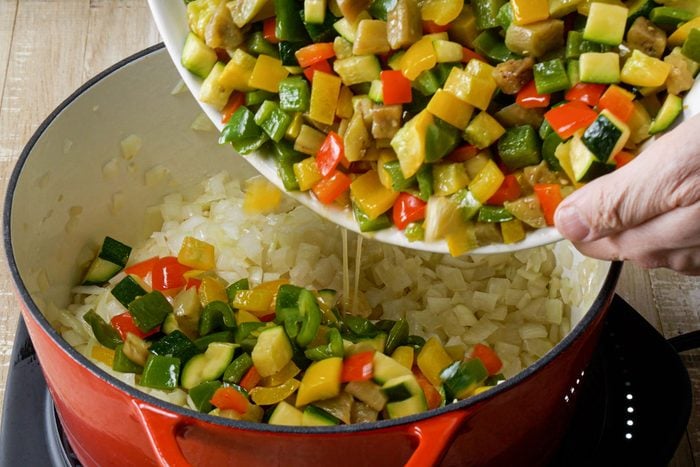
Add the stock, bay leaf, thyme, rosemary, salt and pepper to the Dutch oven, and stir everything to combine. Bring the stock to a boil, then reduce the heat and simmer, uncovered, for 30 minutes.
Editor’s Tip: Replace 1/4 cup of the vegetable stock with a dry white wine for even more flavor.
Step 4: Peel the tomatoes
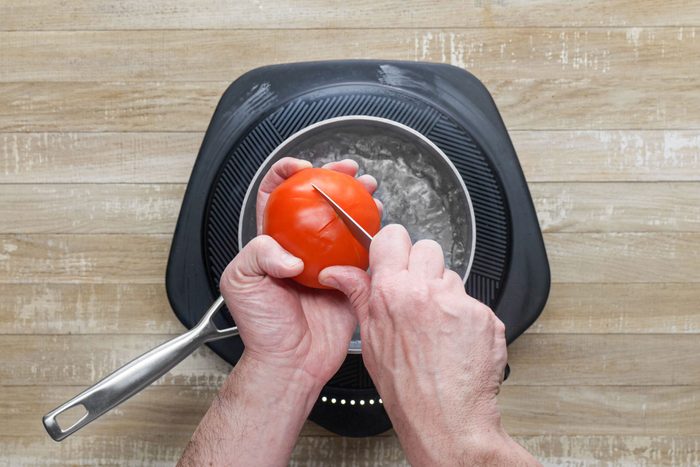
Meanwhile, fill a large saucepan two-thirds with water and bring it to a boil. Score an “X” on the bottom of each tomato. Using a slotted spoon, place the tomatoes in the boiling water for 30 to 60 seconds.
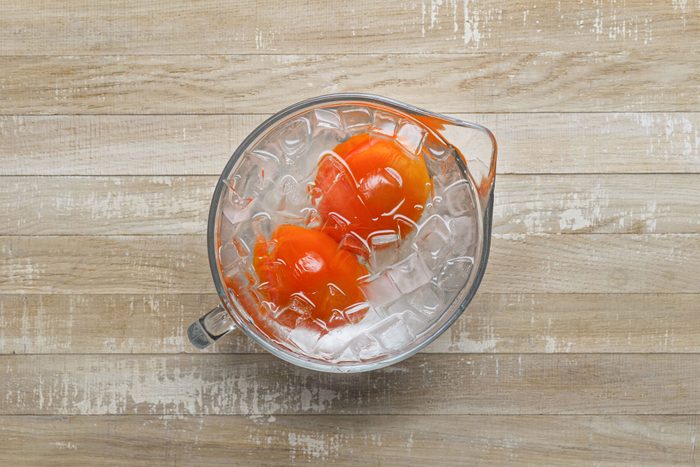
Remove the tomatoes and immediately plunge them into ice water. Peel the tomatoes and discard the skins. Coarsely chop the tomatoes.
Editor’s Tip: Blanching tomatoes is an easy way to remove the skins, but it’s not the only way. Here’s a guide on how to peel tomatoes for ratatouille or any recipe.
Step 5: Reduce the liquid
Drain the vegetable mixture while reserving the juices. Remove vegetables from the pan and set aside. Return the juices to the Dutch oven and bring to a boil. Cook until thickened, about five minutes.
Step 6: Combine everything and serve
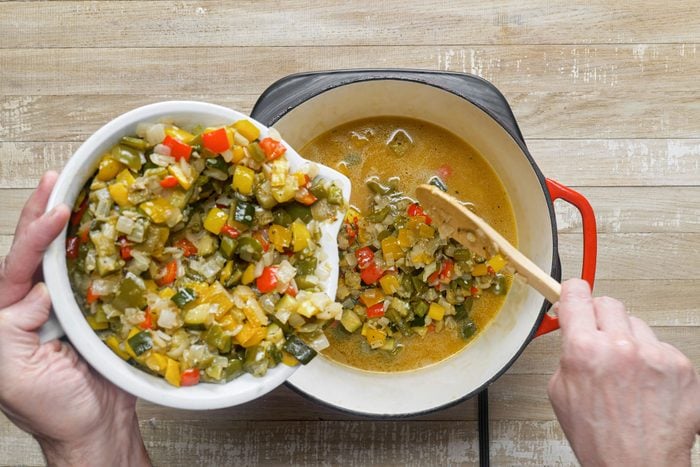
Return the vegetables to the Dutch oven.
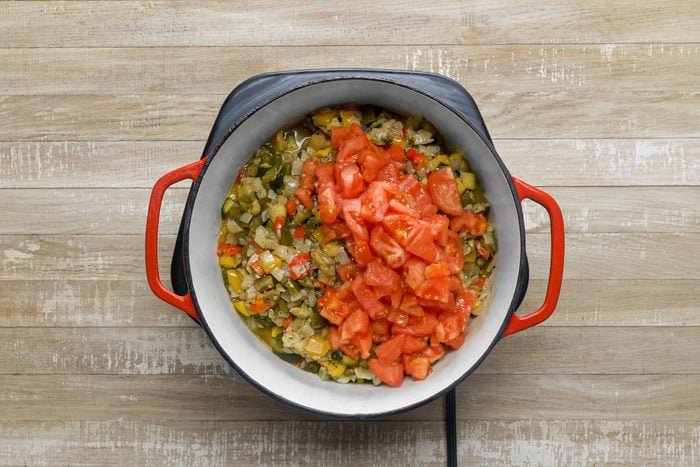
Stir in the tomatoes and mix well to combine everything together. Discard the bay leaf before serving.
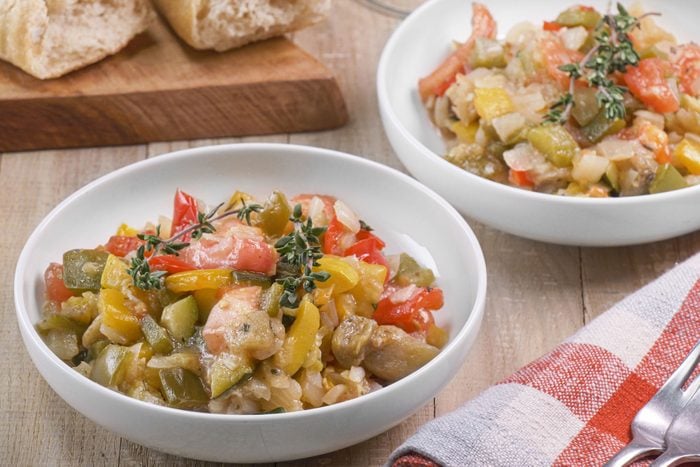
Recipe Variations
- Make the dish with sliced vegetables: Instead of cutting the vegetables into pieces, make 1/2-inch-thick slices and arrange them upright in a concentric, circular pattern. It’s time-consuming but the results are definitely photogenic.
- Use different vegetables: Play with adding, subtracting or replacing vegetables. Try celery root, fennel, pearl onions, button mushrooms or even kohlrabi.
- Add even more flavors: If you want to add some salty, briny flavor, add in some sliced olives, capers or even a few thick cubes of mozzarella.
- Use different herbs: To make this a touch more authentic, seek out herbes de Provence: a mix of dried savory, marjoram, rosemary, thyme, oregano and sometimes lavender. You can also skip the bay leaf it you don’t have one, and finish the dish with a scattering of chopped basil, parsley or oregano, or even a few dollops of premade pesto or green olive tapenade.
- Make it on the grill: One of my favorite variations is to make some ratatouille while I have the grill going. Dice the eggplant, summer squash, onions, and bell peppers, add some whole cloves of peeled garlic, coat everything with olive oil, herbes de Provence and salt, then arrange the mixture in a grill basket. Place the basket away from the direct flames, and cook until the eggplant is soft. At the last minute, toss in some whole cherry tomatoes. Remove the garlic, toss and serve.
How to Store Ratatouille
If you’re serving ratatouille at room temperature, it can safely sit out for up to two hours. Store it in a tightly sealed storage container for up to four days in the refrigerator. It can be enjoyed cold—and even gets better after a couple days as the flavors meld.
Can you freeze ratatouille?
Freeze ratatouille in a tightly sealed container for up to three months. When you’re ready to eat it, let it defrost in the refrigerator for about eight hours. The vegetables will inevitably weep a bit, so just spoon off any excess liquid or stir it back into the sauce. If you’re going to serve it warm, place the frozen ratatouille in a sauce pan, cover it and heat it over a medium-low flame.
Ratatouille Tips
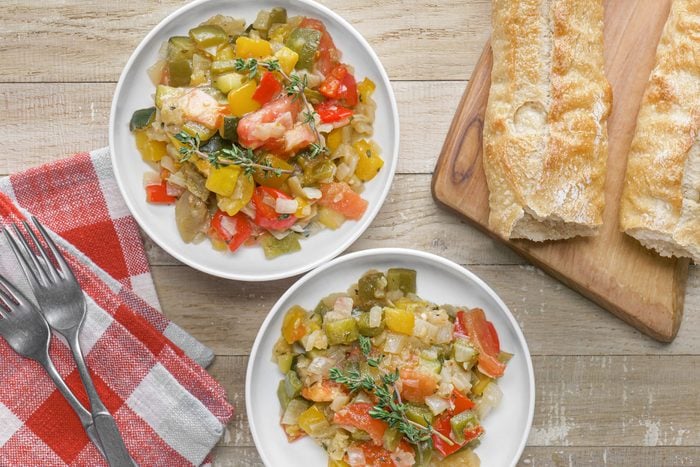
What can you do if ratatouille is watery?
If your ratatouille is watery and not saucy, try removing some of the liquid with a spoon. You can also continue to simmer it over low heat until it has reduced.
How do you serve ratatouille?
On a hot day, ratatouille is delicious served cold; on a cold day, the opposite. All you need is some crusty bread, and you’re good to go! Just keep in mind that if you’re serving it cold it will need a touch more salt to make the flavors pop. As an entree, serve ratatouille over some creamy polenta. As a side dish, serve it with white wine garlic chicken, easy grilled salmon or simple, picnic-friendly ham sliders. It’s good the day it’s made but even better after the flavors have had a chance to mingle a bit.
What can you do with leftover ratatouille?
Ratatouille can be so much more than a side dish! Add leftover ratatouille to tomato soup, or spoon some on top of omelets or cheese-filled crepes. Use it as a relish on a roast beef sandwich, or coarsely chop it and mix with canned and drained white beans for a chunky dip.




















